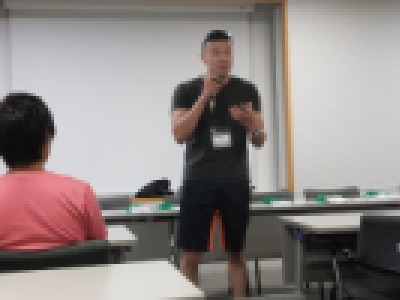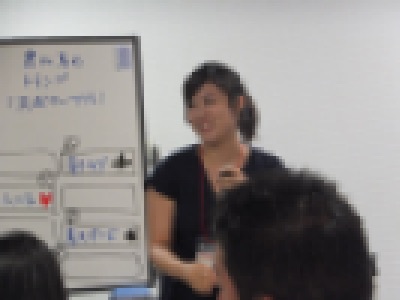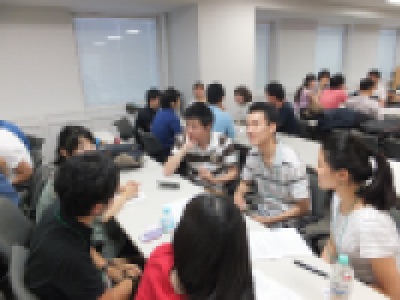1.後半マテリアルの紹介 Mさん

2.後半マテリアルの紹介 Yさん

3.ディスカッション中の様子

:::::::::::::::::::::::::::::::::::::::::::::::::::::::::::::::::::::::::::::::
《 今回のworkshop 》
○workshop参加人数:52名(うち新人の方:4名)
○【前半】:English education in Japan
○【後半】:Where you live matters more than ever ~Urban Centralization Comes Back Again or What?~
:::::::::::::::::::::::::::::::::::::::::::::::::::::::::::::::::::::::::::::::::
みなさまこんにちは、E’s club幹事のKです。
7月22日(土)開催の第154回workshopの詳細をお送りいたします。
今回は前半のマテリアルをMさん、後半のマテリアルをYさんにご作成いただきました。
前半は”English education in Japan”、後半は”Where you live matters more than ever ~Urban Centralization Comes Back Again or What?~”というテーマでそれぞれディスカッションを行います。
[今週のマテリアル]
≪FIRST HALF≫
Hi. I really like studying languages:English and Spanish. Everyone coming to E’s club must love studying English. So I would like to talk about English education in Japan.
Thinking about English teachers you’ve met in school, can you say they were great? I didn’t see English teachers talk in English and I didn’t have any chance to speak up in English through classes. What about you? I’d like to know your experience. http://m.huffpost.com/jp/entry/7653970
Next, let’s think about English education for the future. Now, an entrance exam is mainly based on difficult grammar, listening, and a long sentence. (It has been changing little by little, though.) In the situation, if a teacher has a good idea of English conversation, it is hard for the teacher to try it. This is because the first priority, for students, is not to improve speaking skill in a class, but to pass the exam. Parents also think so. Should we learn English only for the reason? Don’t you think speaking is more important when you study a language? What do you think about this? If you believe we have to change, what should we do in a class so that future children can speak English well?
※An entrance exam is going to change in the future. It will include speaking and writing more, like TOEFL.
http://chu.benesse.co.jp/ck/2015-2021mirai/
http://www.keinet.ne.jp/dnj/20/20kaisetsu_02.html
1, Do you like studying English? Why? Why not?
2, How come you join E’s club?
3, What do you think about English teachers you’ve met?
4, What do you think is a problem in English education?
5, Do you agree or disagree with a new entrance examination that will be held in the future?
6, If you were an English teacher, what would you do in your class?
≪LATTER HALF≫
[Agenda]
Where you live matters more than ever
~Urban Centralization Comes Back Again or What?~
As a work style has been diversified in so many ways,
it seems there is no such restriction as of where you live
for living compared to decades ago.
You may work at countryside and still get paid well by
exporting any region-oriented service or product to
oversea countries through internet.
On the other hand, there is a strong belief that your salary
depends more on where you live rather on your resume.
(Please refer to materials below for details.)
Given such circumstances, please share your idea on following questions.
[Questions]
Q1. Have you ever worked in rural area? If so, please compare
your life quality between back then and now in terms of payout
as well as social life, share your thought on this.
Q2. According to Morretti, the economist and researcher, he believes
you can get great benefit in terms of salary from where you live,
no matter what occupation you are. (He calls it as “multiplier effect”)
Please share pro/con and your thought on this.
Q3. Morretti takes example of Seattle as a successful place to work
as it became one of the biggest city in United States after
Microsoft located their headquarter from other place.
Do you know any other place as Seattle which is developed at
rapid pace for some reason, in any country including Japan?
If so, please share your thought on what made difference
between those developed and those undeveloped?
Q4. Moretti mentions (not in this article), Tokyo is one of the biggest city
in the world in terms of density of how many important monuments
located within 5 km from city center.
According to his belief, you can get great benefit from Tokyo, especially
in terms of salary and social life, compared to any other region in Japan.
Do you support his idea? Please share your thought on this.
(If time allows)
Q5. Do you have any place you want to live? (does not have to be related to work)
Please share your thought on this.
Several group idea (random select) of Q4 will be shared at the end of Latter Half (5mins)
[Reference]
The New Geography Of Jobs: Where You Live Matters More Than Ever
(2012 May 22th,Forbes)
“It wasn’t supposed to be this way. As the global economy shifted from manufacturing to innovation,
geography was supposed to matter less. But the pundits were wrong. A new map is being drawn – the inevitable
result of deep-seated but rarely discussed economic forces,” says author and Berkeley Economics Professor,
Enrico Moretti. His book, The New Geography Of Jobs, is available on book stands today, and its surprising message
will soon be on the lips of millions. Who knew that your salary depends more on where you live than on your resume.
Where are the good jobs, and why are they located where they are? Why have Stamford, San Jose and Seattle added
thousands and thousands of jobs while Mansfield, Modesto and Merced have been stagnant or gotten smaller
in the last twenty years? Why have workers, innovators, researchers and investors swarmed to specific places
on our map, and continue the migration to this day? What is happening? Why do certain places in the country
like Silicon Valley, Ann Arbor, Seattle, Austin and Boston, continue to attract top companies and top employees,
while paying the best wages and topping the lists for innovation, patents and productivity?
The Multiplier Effect
In The New Geography Of Jobs, Moretti, the economist and researcher, gives us the answers to those questions
so that we may capitalize on the innovation, opportunities and progress right here within the borders of our America.
There is opportunity in small pockets all over the country, but the innovation hubs are where the jobs and pay are at
for almost everybody, from scientists, engineers, programmers and researchers, to doctors, mechanics, carpenters,and barbers.
It’s what Moretti calls the multiplier effect. He estimates that for every innovation job that is added, another five jobs
are added in the local service economy. Moretti notes also, that innovation jobs have double the multiplier effect that
manufacturing jobs do. What’s more, because innovation jobs are typically much higher paying, the service jobs pay more too.
It Pays To Be A College Graduate, But It Pays More To Live With Them
Yes, in terms of salary where you live may matter more than your resume, but living in metropolitan areas
where there are high concentrations of college educated workers is what will push your pay higher.
See the table below that shows the concentrations of college educated workers in various metropolitan areas,
and their average salaries. Having a college education also tends to make workers more mobile, and mobility is important]
because it increases one’s ability to move between innovation hubs as the knowledge economy continues to shift where we work.
Shift Happens
The New Geography Of Jobs explains the major shifts taking place in the United States economy and reveals the
surprising winners and losers – specifically, which jobs will drive economic growth and where they’ll be located.
Which communities will transform themselves into dynamic innovation hubs in 2012 and beyond? It can be done.
Get educated, get a map and get going!
***********************************************************
私たちと一緒に英語コミュニケーション能力を鍛えませんか?
ご興味を持たれた方は、
入会申込フォーム
https://english-speaking-club.com/cms/?page_id=93
よりお申し込みください。お待ちしています!
***********************************************************